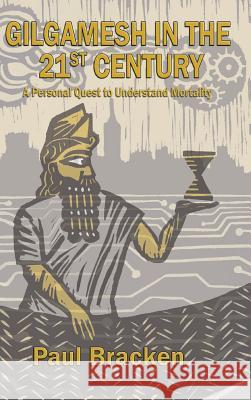Gilgamesh in the 21st Century: A Personal Quest to Understand Mortality » książka
Gilgamesh in the 21st Century: A Personal Quest to Understand Mortality
ISBN-13: 9780615968605 / Angielski / Twarda / 2013 / 290 str.
Gilgamesh in the 21st Century: A Personal Quest to Understand Mortality
ISBN-13: 9780615968605 / Angielski / Twarda / 2013 / 290 str.
(netto: 111,06 VAT: 5%)
Najniższa cena z 30 dni: 116,94
ok. 16-18 dni roboczych.
Darmowa dostawa!
"Must I die?" asked Gilgamesh. Forty five centuries later, we're still asking the same question. Science writer Paul Bracken embarks on a lighthearted assessment of the human condition, to explore what it means to be mortal, and what our fate may be. This scientific reimagining of the ancient Gilgamesh quest delves into a multitude of topics including the origin of life, the workings of the human mind, and the possibilities for life prolongation. The ancient Gilgamesh was so distraught at the death of his friend Enkidu, and so sickened by the knowledge that he too would die, that he rebelled against his fate and set out on a search for salvation. Likewise, at the age of eleven, Bracken wondered if there might be a way to bring his grandfather back from the dead and has been pondering this question ever since. Is death a problem to be solved, or is it an essential aspect of our humanity? "We human beings instinctively resist the notion of personal extinction. In his thoughtful and hugely readable Gilgamesh in the 21st Century, Paul Bracken canters effortlessly through an amazing range of science to help put this fraught human proclivity in perspective, both for himself and for us." -- IAN TATTERSALL, American Museum of Natural History, New York City.
"Must I die?" asked Gilgamesh. Forty five centuries later, were still asking the same question. Science writer Paul Bracken embarks on a lighthearted assessment of the human condition, to explore what it means to be mortal, and what our fate may be. This scientific reimagining of the ancient Gilgamesh quest delves into a multitude of topics including the origin of life, the workings of the human mind, and the possibilities for life prolongation. The ancient Gilgamesh was so distraught at the death of his friend Enkidu, and so sickened by the knowledge that he too would die, that he rebelled against his fate and set out on a search for salvation. Likewise, at the age of eleven, Bracken wondered if there might be a way to bring his grandfather back from the dead and has been pondering this question ever since. Is death a problem to be solved, or is it an essential aspect of our humanity?"We human beings instinctively resist the notion of personal extinction. In his thoughtful and hugely readable Gilgamesh in the 21st Century, Paul Bracken canters effortlessly through an amazing range of science to help put this fraught human proclivity in perspective, both for himself and for us."-- IAN TATTERSALL, American Museum of Natural History, New York City.











